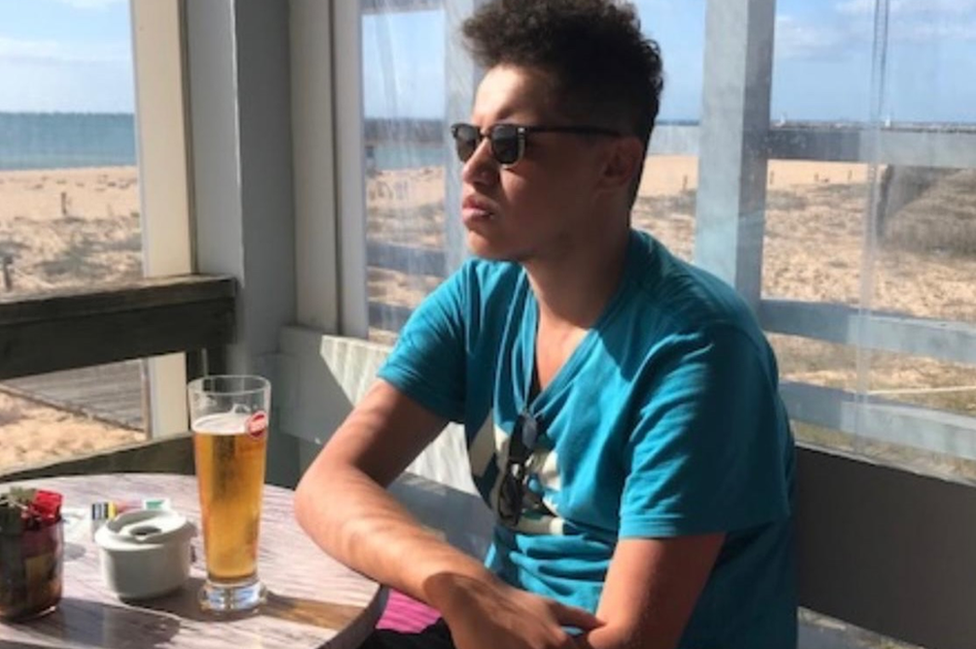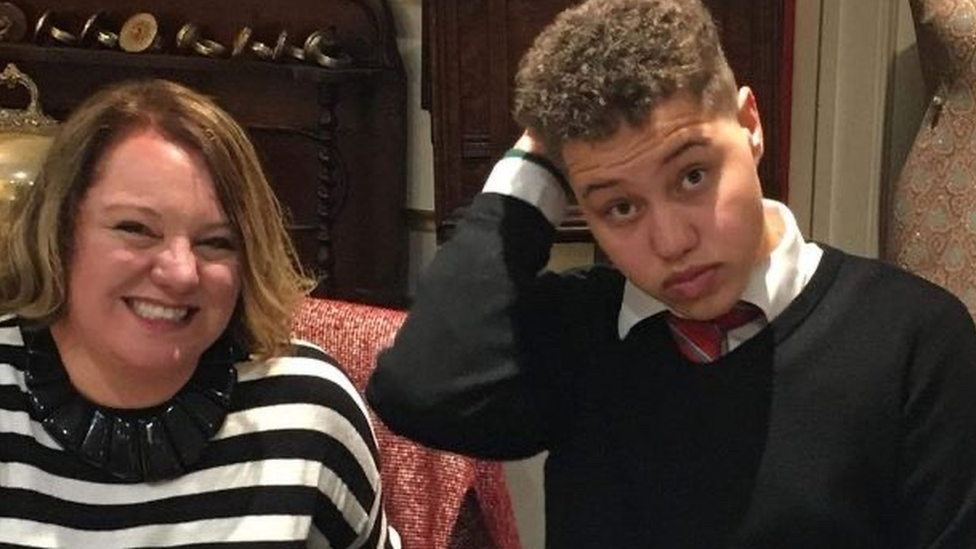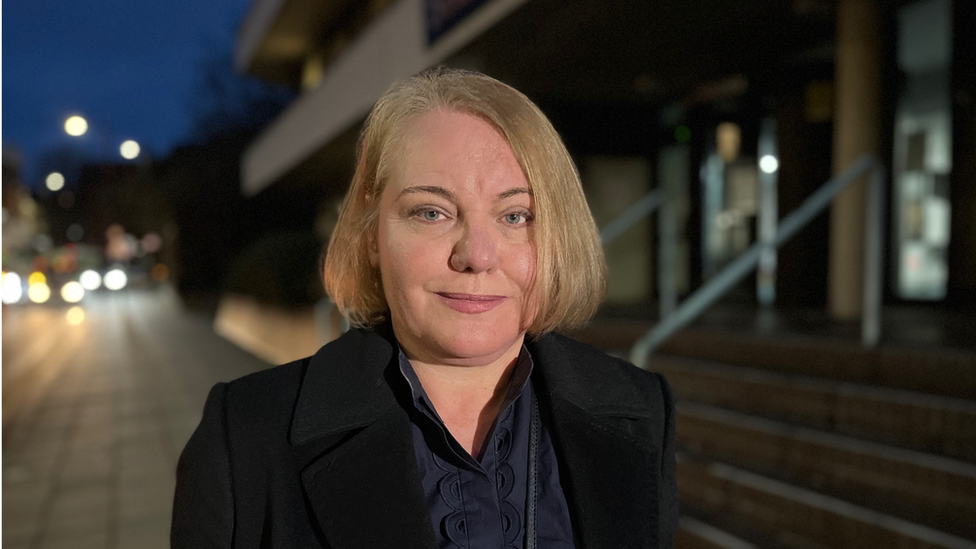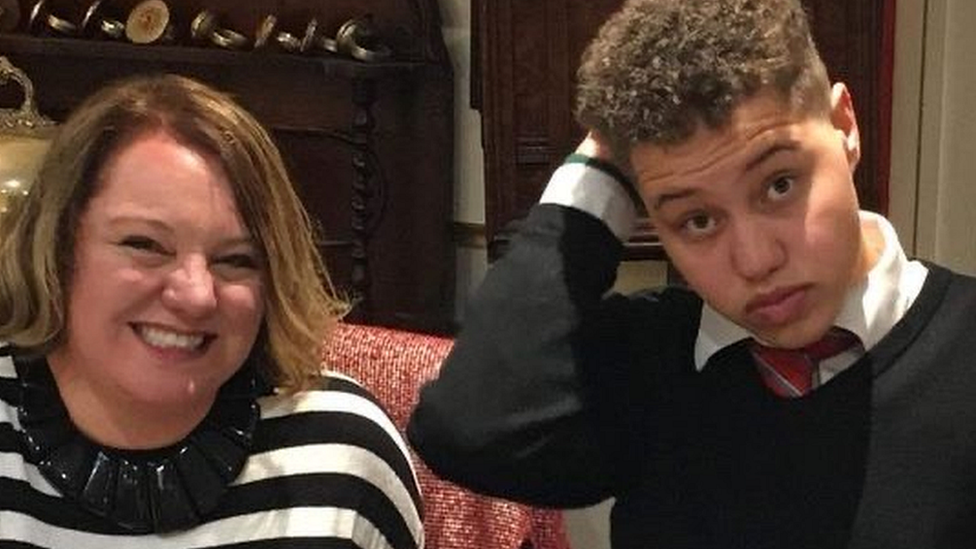Lack of autism awareness contributed to Essex teen's death - inquest
- Published

Chris Nota was failed by a "fundamental misunderstanding" of vulnerable people with autism
A lack of awareness about the "increased" risk behaviour in people with autism contributed to the death of a teenager, a coroner has concluded.
Chris Nota, 19, from Southend-on-Sea, died on 8 July 2020 after falling from a bridge just over a week after being discharged from a mental health unit.
The inquest concluded that concerns about Mr Nota's safety in the community had not been shared by medical staff.
His mum Julia Hopper wants an inquiry into Essex NHS mental health services.
"While the ruling was definitive, it is our terror that it will not make any difference in practice and we need a statutory public inquiry into Essex mental health services to look deeper at it and identify what is needed," she told the BBC after the hearing in Chelmsford.
Mr Nota was under the care of Essex Partnership University NHS Foundation Trust (EPUT), which provides mental health services.
The teenager, who had been admitted to hospital several times over three months, died from multiple injuries.
He had been discharged to Hart House rehabilitation unit in Southend, despite his mother raising concerns that this was not appropriate given his risk level.
'Fundamental misunderstanding'
Coroner Sean Horstead said there was insufficient evidence that Mr Nota had intended to take his own life.
In a narrative conclusion, he said the "following matters probably more than minimally contributed to the death".
"A significant concern arises in this case about a fundamental misunderstanding of the vulnerability of those suffering autism spectrum disorder, with or without learning difficulties, with respect to suicidal ideation and risk behaviour in the context of ambivalence to safety," he said.
He said there had been a "lack of autism-focused approach" to risk assessments and care planning.
This included a lack of understanding of the impact of his autism on his risk level, presentation and communication, and a failure to make adjustments.

Clinicians failed to properly engage with Chris Nota's mother Julia Hopper about his care, risk assessments and other safeguarding issues, the inquest heard
Mr Horstead also noted there had been "a failure" to sufficiently consider detaining Mr Nota under the Mental Health Act after rapid readmission to hospital and his high-risk behaviour in the community.
He said he would be "extremely surprised" if issues surrounding a lack of understanding of the impact of autism were unique to EPUT.
The inquest heard that in emails, not shared with other clinicians, one member of the community support team said: "I am not confident we can keep this young man safe."
The failure to share their level of concern about Mr Nota's safety with his family, Hart House or other clinicians was "a serious failure" which led others to "underestimate the risks" he was presenting with, the coroner said.

Julia Hopper said she was worried there was still a risk to other people
A lack of autism specialists involved in Mr Nota's mental capacity assessments was a "significant failure" as those assessing Mr Nota were "insufficiently experienced", the coroner added.
He also criticised some emails in which clinicians spoke "inappropriately and unprofessionally" about Ms Hopper, making judgements about why she did not want her son to return to the family home.
Ms Hopper had made it clear this related to ensuring appropriate measures were in place first. However, clinicians suggested Ms Hopper was trying to continue to receive benefit for her son by refusing to formally evict him.
The coroner also said Ms Hopper had been an "underemployed resource from the outset" when it came to contributing to her son's risk assessments, safeguarding, care plans and capacity assessments.
"To not engage in an appropriate manner with Julia from the outset was in my view a significant shortcoming in the way matters were dealt with," he said.
Paul Scott, chief executive of EPUT, said: "I would like to express my deepest condolences to Chris's family and loved ones, who remain in our thoughts."We are dedicated to helping people in their time of need and the death of anyone who has been in our care is devastating.
"We fully accept the coroner's findings and have put in place a number of measures to improve the care we provide for people who have autism or a learning disability."
Ms Hopper said: "I can't get my son back but if we get the inquiry, we can help prevent future deaths."

Find BBC News: East of England on Facebook, external, Instagram, external and Twitter, external. If you have a story suggestion email eastofenglandnews@bbc.co.uk, external
- Published13 September 2022
